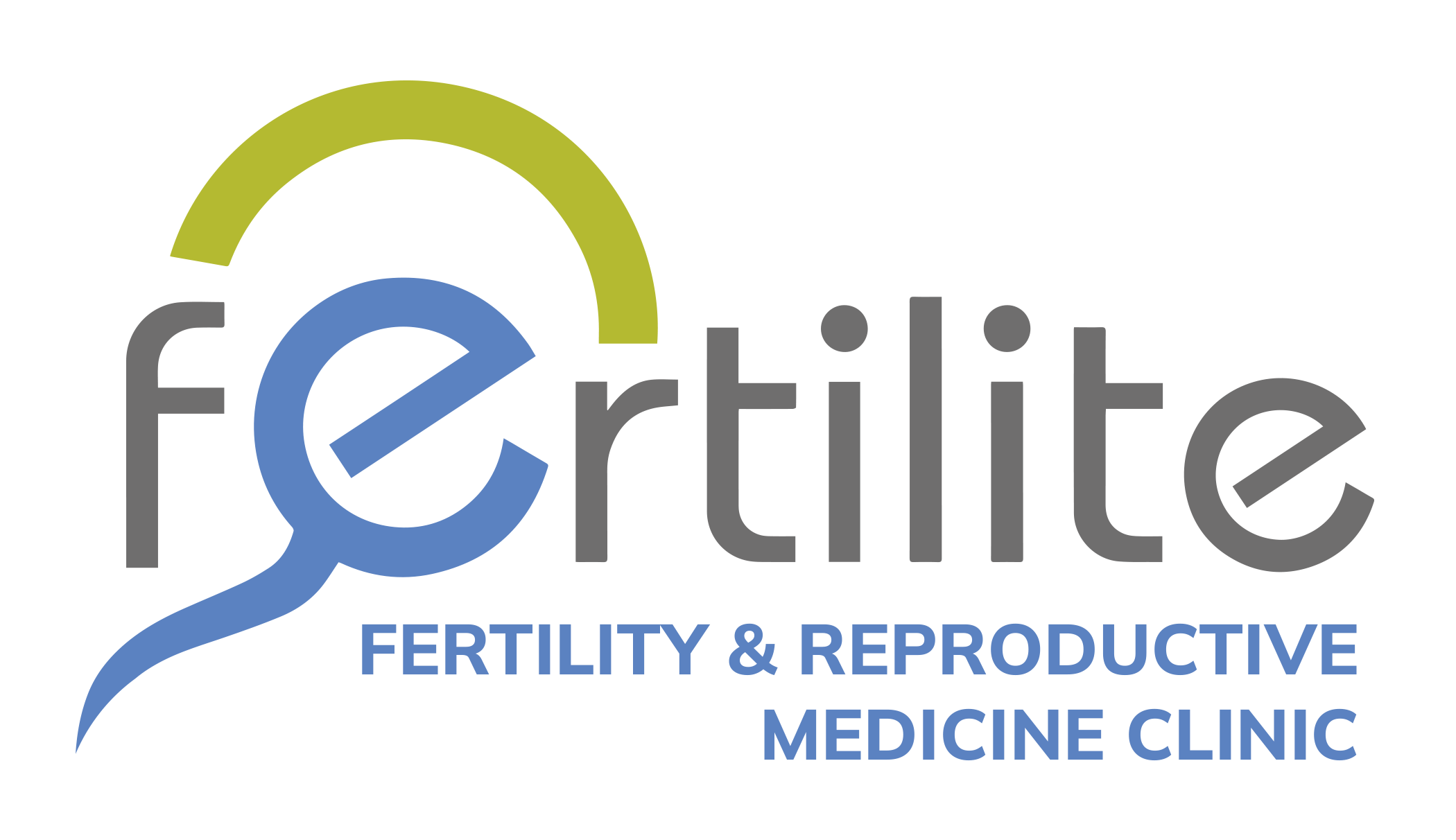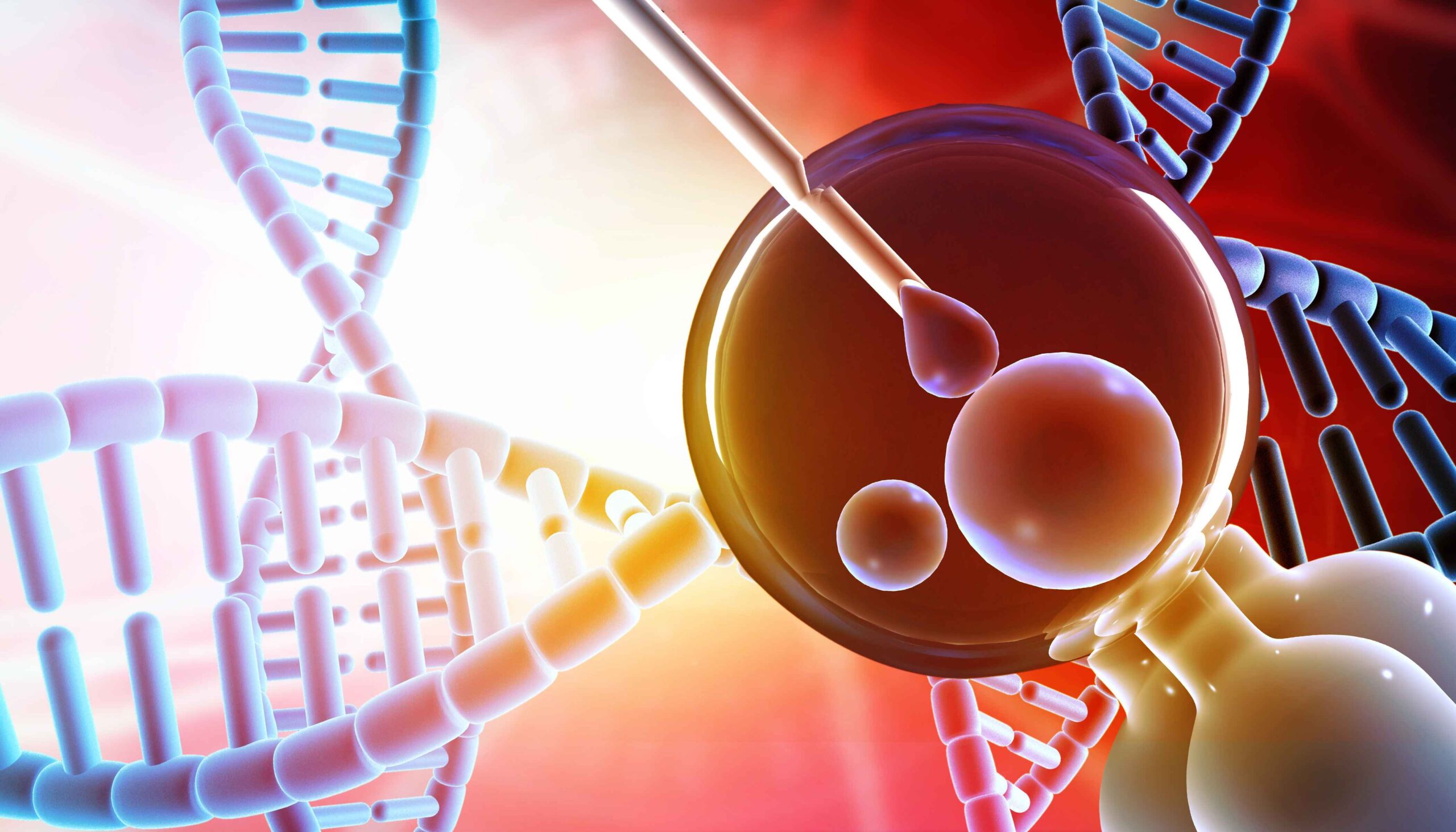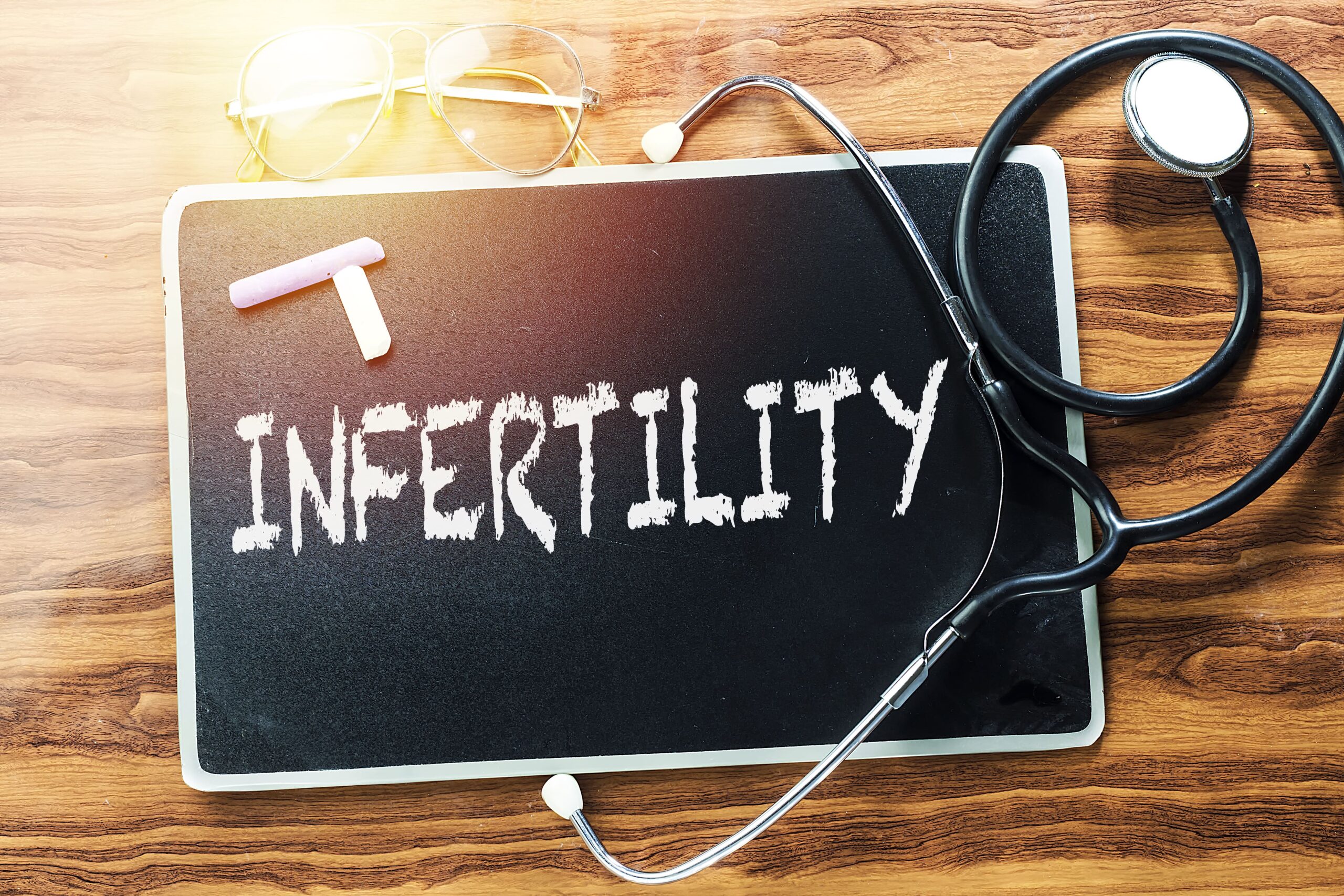The journey to parenthood through assisted reproductive technology can be both exciting and overwhelming. For many couples and individuals struggling with infertility, in vitro fertilization (IVF) offers renewed hope of conceiving a child. This comprehensive guide aims to demystify the IVF process, providing a detailed look at each step, the typical timeline, and the crucial role of fertility specialists. Whether you’re just beginning to explore IVF or are ready to start treatment, this article will equip you with the knowledge to navigate your path to parenthood with confidence.
Table of Contents
- What is In Vitro Fertilization or IVF?
- IVF Success Rates and Managing Expectations
- In Vitro Fertilization Steps: A Step-by-Step Breakdown
- IVF Process and Timeline: What to Expect
- The Role of Fertility Doctors in IVF
- When Should You Consult a Fertility Specialist?
- Your IVF Journey with Fertilite Center
- Frequently Asked Questions
What is In Vitro Fertilization or IVF?
In Vitro fertilization (IVF) is a medical procedure used to help individuals or couples conceive a child. The term “in vitro” means “in glass,” referring to the process of fertilizing an egg with sperm outside the body in a laboratory setting. The resulting embryo is then transferred to the uterus, where it can implant and develop into a pregnancy.
The IVF process is commonly used for those experiencing infertility due to factors like ovulation disorders, blocked fallopian tubes, low sperm count, unexplained infertility, or other medical conditions. It is also used in cases involving donor eggs, sperm, or surrogacy.
The in vitro fertilization process steps are often recommended for:
- Ovulation disorders
- Blocked fallopian tubes
- Low sperm count or poor sperm quality
- Unexplained infertility
- Donor egg, sperm, or surrogacy cases
IVF Success Rates and Managing Expectations
When beginning the IVF process and timeline, many patients are curious about success rates. These depend on factors like age, egg and sperm quality, uterine health, and the clinic’s expertise.
Key Factors Influencing IVF Success:
- Age: The age of the woman, particularly if using her own eggs, is one of the most significant factors affecting IVF success. Success rates tend to decline as women age, especially after 35.
- Ovarian reserve – The quantity and quality of a woman’s eggs play a crucial role in IVF success. Tests like AMH (Anti-Müllerian Hormone) and antral follicle count can provide insights into ovarian reserve.
- Sperm motility and count: The health and motility of sperm can affect fertilization rates and embryo quality.
- Uterine health (fibroids, endometriosis, adenomyosis): The condition of the uterus, including factors like fibroids or adenomyosis, can impact implantation success.
- Lifestyle choices: Smoking, excessive alcohol consumption, and being significantly overweight can negatively affect IVF outcomes.
- Previous pregnancy history: Women who have been pregnant before, even if it didn’t result in a live birth, may have higher success rates with IVF.
- Clinic’s Experience and Technology: The expertise of the medical team and the advanced technologies available at a clinic can influence success rates..
In Vitro Fertilization: A Step-by-Step Breakdown?
The IVF journey involves several steps, usually spread across 4–6 weeks. The IVF process typically unfolds over several weeks, with each phase carefully timed to optimize your chances of success. While the exact timeline can vary depending on individual circumstances and clinic protocols, understanding the general sequence of events can help you prepare mentally and logistically for the journey ahead. It involves several stages designed to help individuals or couples achieve pregnancy. Below is the IVF steps timeline with each stage explained:
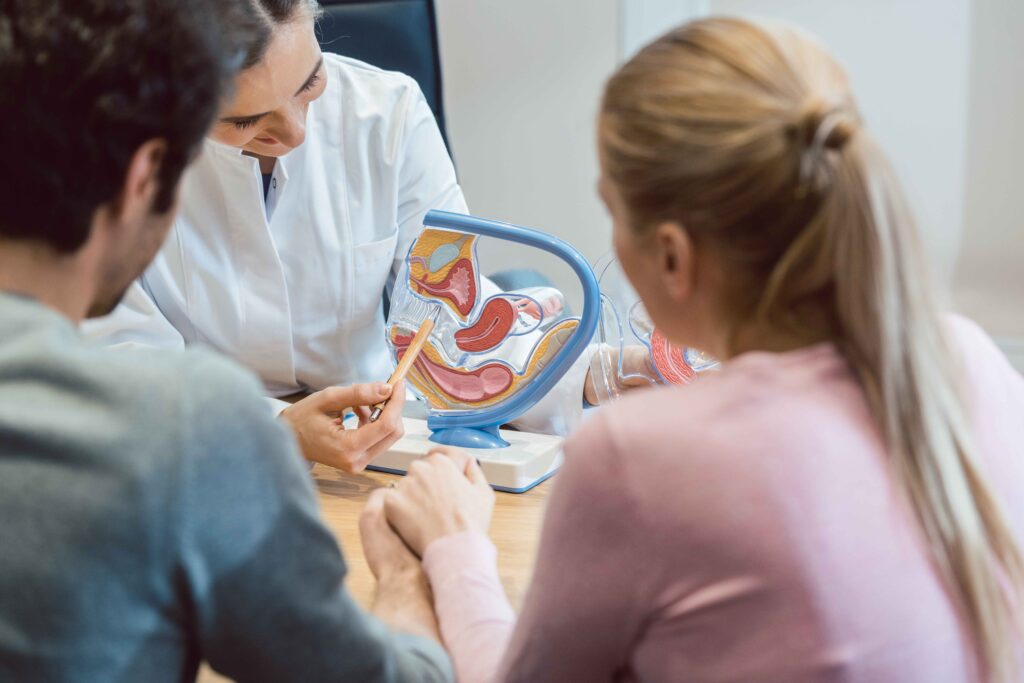
Step 1: Initial Consultation – How to Start IVF:
Your IVF journey begins with diagnostic testing: bloodwork, ultrasounds, and semen analysis. This helps determine if IVF is the right approach and outlines your personalized treatment plan.
Step 2: Ovarian Stimulation (10–14 days): Hormone injections stimulate the ovaries to produce multiple eggs. Regular monitoring via ultrasounds and blood tests ensures correct timing.
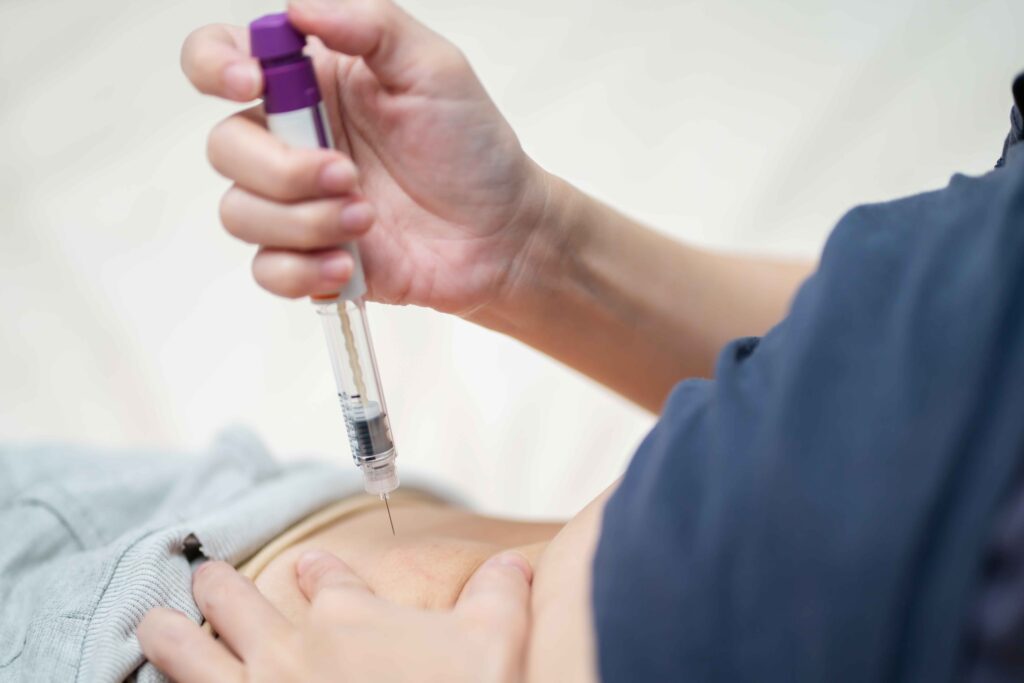
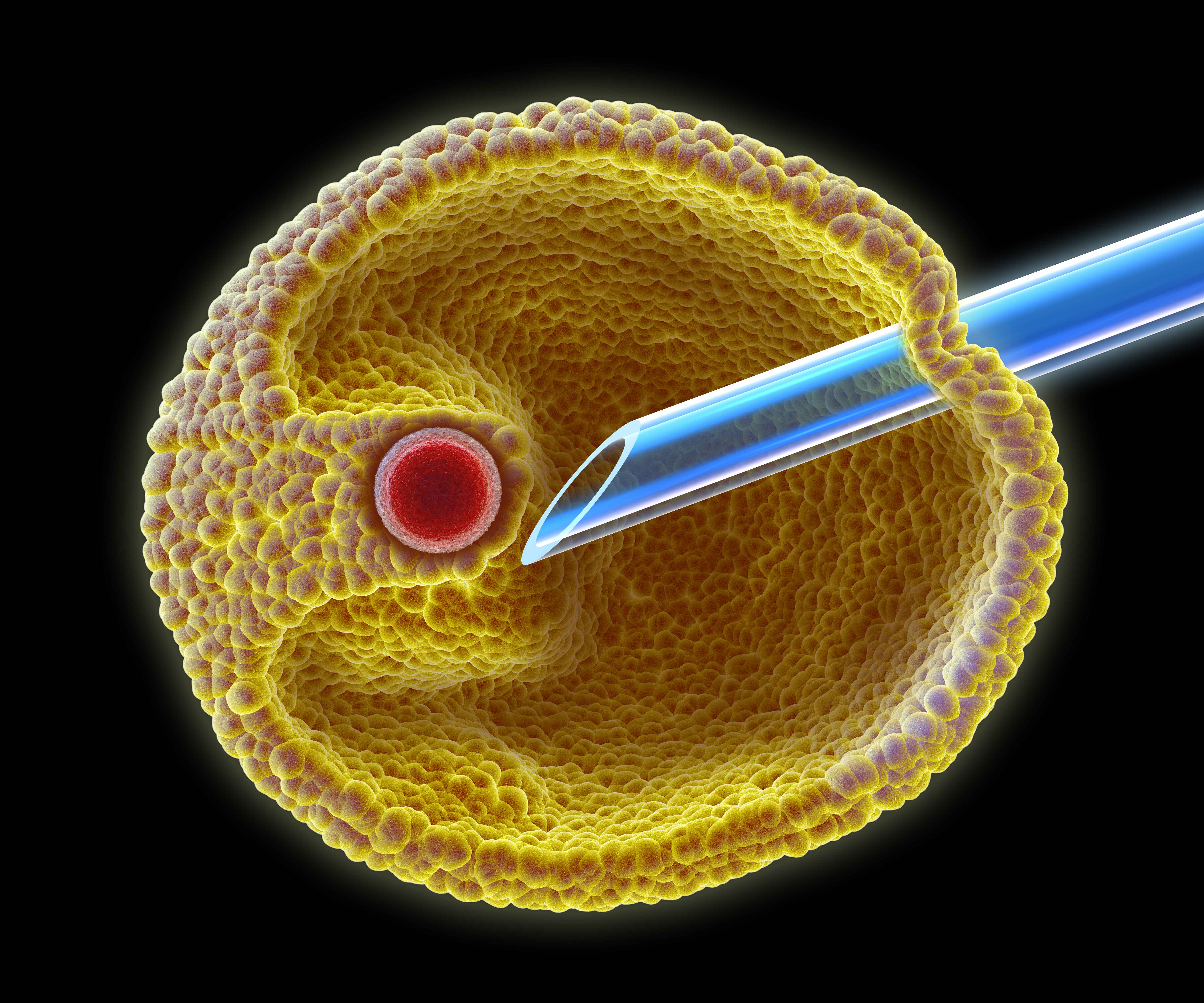
Step 3: Egg Retrieval & Sperm Collection: Once eggs mature, they’re retrieved under light sedation. On the same day, sperm is collected from a partner or donor..
The goal is to retrieve 8 to 15 eggs for fertilization. In some cases, fewer eggs may be retrieved if the ovaries do not respond strongly, or more eggs may be produced with the help of higher doses of hormones.
Step 4: Fertilization (Day 1–5): Eggs are fertilized in the lab either naturally or via ICSI (intracytoplasmic sperm injection). Embryos develop over 3–7 days. Genetic testing may be performed during this stage.
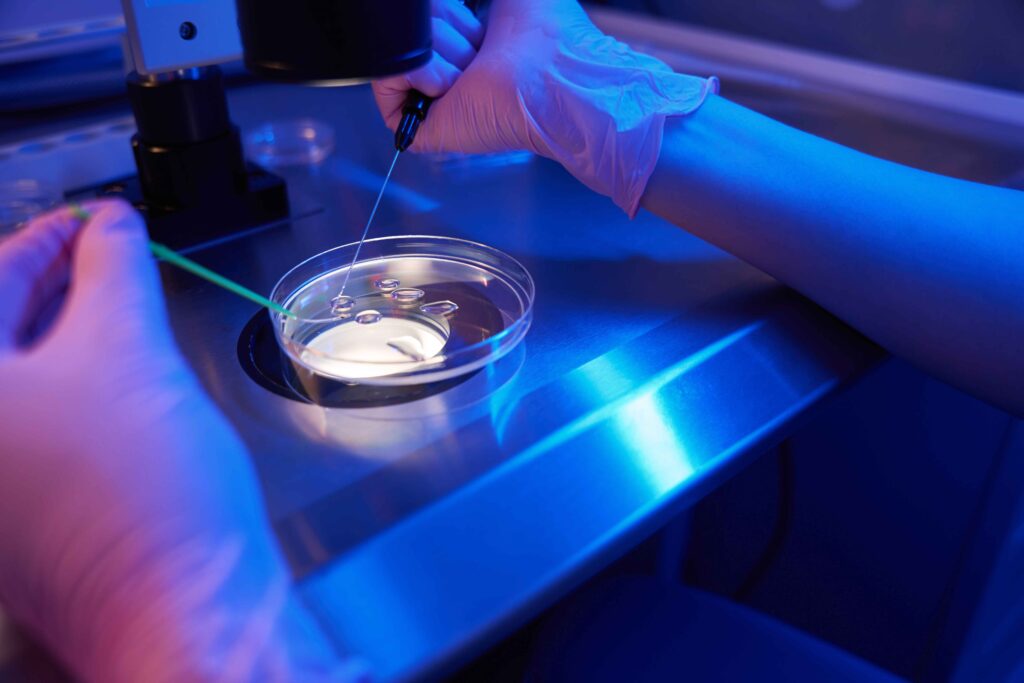
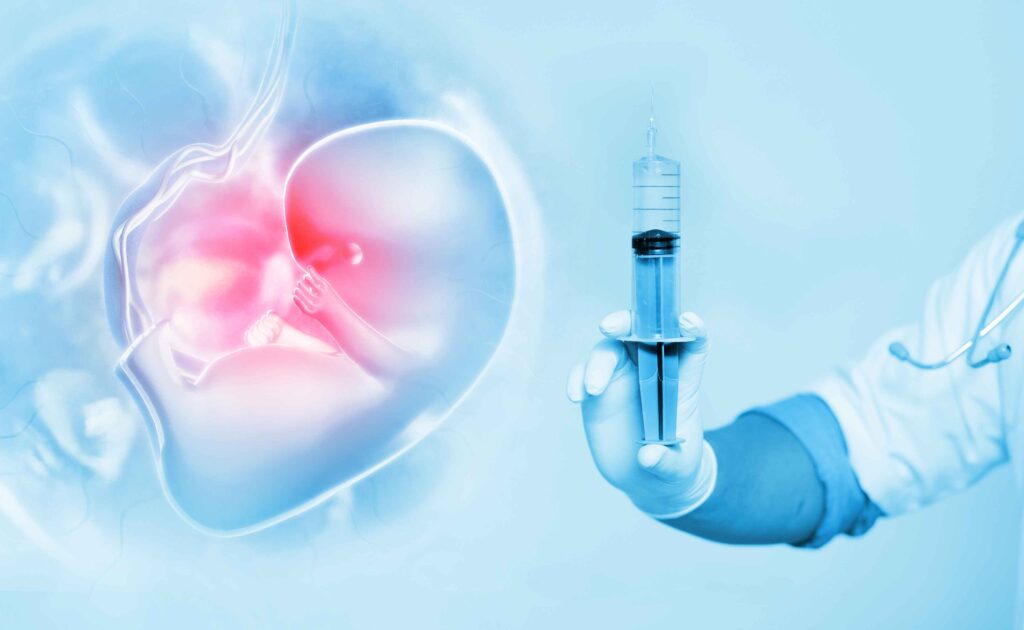
Step 5: Embryo Transfer (Day 5–6): A selected embryo is placed into the uterus using a thin catheter. Remaining embryos may be frozen for later use.
Step 6: Luteal Phase Support & Pregnancy Test: Progesterone is prescribed to support implantation. A pregnancy test is scheduled 9–14 days post-transfer. This can be an emotionally challenging time as you anxiously await the results. Your clinic will schedule a blood pregnancy test approximately 9–14 days after the transfer to determine if implantation was successful.
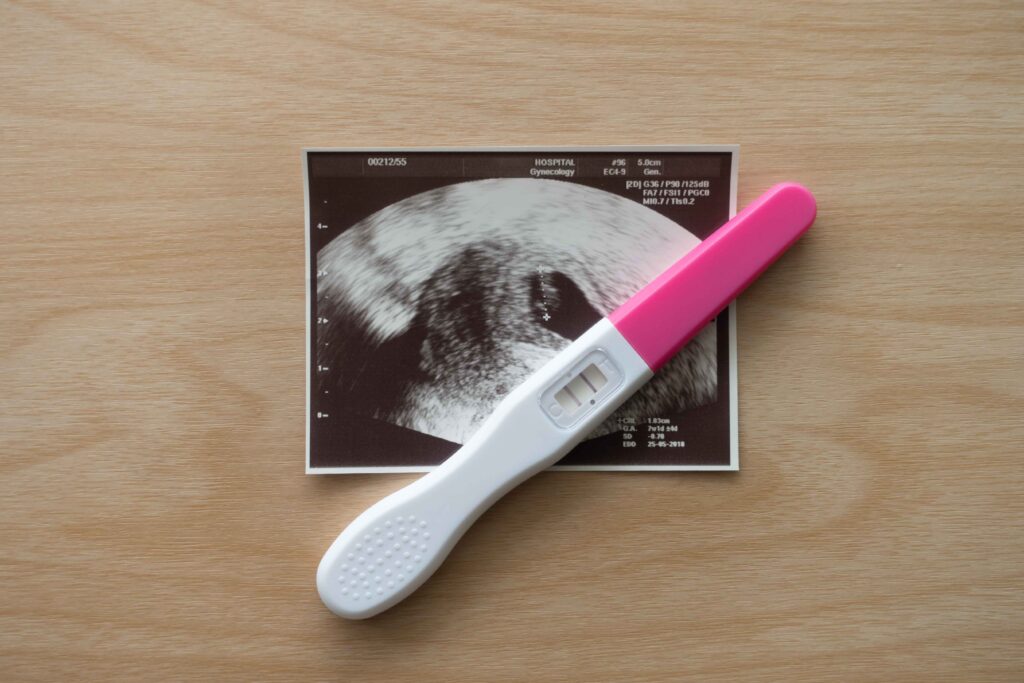
This IVF process step-by-step timeline represents one cycle. Some patients may need multiple cycles before success.
IVF Process and Timeline: What to Expect
The in vitro fertilization process timeline typically follows this structure:
- Week 1–2: Initial tests and starting medications: During the first stage of the steps in IVF process, you’ll meet with your fertility doctor, complete diagnostic tests (bloodwork, ultrasounds, and semen analysis), and begin hormone medications. This step lays the foundation for the rest of the IVF journey.
- Week 3: Ovarian stimulation and monitoring: This stage of the IVF steps and timeline focuses on stimulating the ovaries to produce multiple eggs. Daily hormone injections are given, and your fertility clinic will closely monitor your response with ultrasounds and blood tests. Adjustments to medication may be made to ensure the best outcome.
- Week 4: Egg retrieval, fertilization, and embryo transfer: This is one of the most critical phases in the IVF process step-by-step timeline. Mature eggs are retrieved under light sedation, while sperm is collected from your partner or donor. In the lab, eggs are fertilized and monitored for development. A healthy embryo is then transferred into the uterus, with extra embryos often frozen for future use.
- Weeks 5–6: Pregnancy testing and next steps: The final part of the IVF steps timeline is often called the “two-week wait.” About 9–14 days after transfer, a blood test will confirm whether implantation was successful. Depending on results, your doctor will discuss next steps—whether continuing with early pregnancy care or planning adjustments for another IVF cycle.
If unsuccessful, most clinics recommend waiting 1–2 cycles before restarting.
The Role of Fertility Doctors in Your IVF Journey
Fertility doctors, also known as reproductive endocrinologists, play a pivotal role in guiding patients through the complexities of IVF treatment. These specialists, like those available at Fertilite Center, have undergone extensive training in reproductive medicine and are equipped to handle a wide range of fertility challenges. Understanding the expertise and support of fertility doctors can help you make the most of this crucial partnership.
- Comprehensive Diagnosis and Treatment Planning: One of the primary responsibilities of a fertility doctor is to conduct a thorough evaluation of your reproductive health. This involves analyzing the results of various diagnostic tests, including hormone levels, imaging studies, and genetic screenings. Based on this comprehensive assessment, your doctor will develop a personalized treatment plan tailored to your needs and circumstances.
- Customizing Your IVF Protocol: Every patient’s journey through IVF is unique, and fertility doctors are skilled at customizing treatment protocols to optimize success rates. This may involve adjusting medication dosages, recommending additional procedures such as ICSI (intracytoplasmic sperm injection) for male factor infertility, or suggesting preimplantation genetic testing for certain patients.
- Monitoring and Adjusting Treatment: Throughout the IVF cycle, your fertility doctor will closely monitor your progress through regular ultrasounds and blood tests. They use this information to make real-time adjustments to your treatment, ensuring that you’re responding optimally to the medications and that the timing of procedures is precise.
- Performing Key Procedures: Fertility doctors are trained to perform the critical procedures involved in IVF, including egg retrieval and embryo transfer. Their expertise in these delicate procedures is essential for maximizing the chances of a successful outcome.
- Providing Emotional Support and Counseling: Beyond their medical expertise, fertility doctors often serve as a source of emotional support for patients navigating the challenges of infertility. They can offer reassurance, help manage expectations, and provide resources for additional support when needed.
- Staying Current with Advancements in Reproductive Medicine: The field of reproductive medicine is constantly evolving, with new technologies and treatment approaches emerging regularly. Fertility doctors are committed to ongoing education and research, ensuring that their patients can access the most current and effective treatment options.
- Coordinating with Fertility Center as Your Care Team: In many cases, your Fertility Center doctor will work as part of a larger team of specialists, including embryologists, nurses, and counselors. They coordinate this team to ensure that all aspects of your care are seamlessly integrated and that you receive comprehensive support throughout your IVF journey.
When selecting a fertility doctor, it’s important to consider not only their clinical expertise but also their communication style and approach to patient care. You should feel comfortable asking questions, expressing concerns, and participating actively in decisions about your treatment. Many patients find it helpful to schedule consultations with multiple doctors before choosing the one they feel is the best fit for their needs. Your partnership with your fertility doctor, built on open communication, fosters confidence and clarity in the IVF process, enhancing your chances of achieving parenthood.
When Should You Consult a Fertility Specialist?
You may want to see a fertility specialist if:
- You’ve tried to conceive for 6–12 months without success
- You’re over 35 and struggling to conceive
- You have irregular cycles, PCOS, endometriosis, or known reproductive health issues
- You’ve had multiple miscarriages
Getting early intervention can improve outcomes and speed up your journey to parenthood.
Fertilite Center: Your best option for IVF
The in vitro fertilization steps may seem overwhelming at first, but with the right fertility team by your side, every stage becomes manageable. At Fertilite Center, our doctors work closely with you to personalize your IVF plan, optimize outcomes, and guide you through the IVF process step-by-step timeline with clarity and confidence. This comprehensive approach shows you exactly how fertility treatment works from start to finish. While the journey may require patience and sometimes multiple attempts, the combination of expert guidance, advanced reproductive medicine, and compassionate care offers real hope for achieving parenthood.
If you’re wondering how to start the IVF process, take control of your fertility journey today—schedule an initial consultation with a Fertilite Center specialist to review your options, undergo necessary tests, and build a customized plan to help you achieve your dream of becoming a parent.
Frequently Asked Questions
- What is the most difficult stage of IVF? –
– Many people find the two-week wait after embryo transfer to be the most difficult stage of IVF, as it’s an emotionally intense period filled with uncertainty. Physically, hormone injections and egg retrieval can also be challenging due to discomfort and side effects. The hardest stage often varies depending on personal resilience and support systems.
- Is IVF a painful procedure?
-IVF itself is not usually described as painful, but certain stages can cause discomfort. Hormone injections may lead to bloating or soreness, and egg retrieval is done under sedation to minimize pain. Most people experience mild side effects rather than significant pain throughout the process.
- Which cycle of the IVF is most successful?
– Success rates in IVF vary widely, but research shows that cumulative success improves with each cycle. While some people achieve pregnancy on the first cycle, many need two or three cycles to maximize their chances. Statistically, the highest success rates are often seen within the first three cycles, after which the likelihood of success begins to plateau.
- What is the best age for IVF?
– The best age for IVF is generally before 35, when egg quality and ovarian reserve are at their peak, giving the highest chances of success. Success rates gradually decline in the late 30s and drop more sharply after 40, though IVF can still help some individuals or couples achieve pregnancy at older ages, often with donor eggs.
- What is the 2-week wait period in IVF?
-The 2-week wait period in IVF is the time between the embryo transfer and the pregnancy test. It’s often considered the most emotionally challenging stage, as patients must wait to find out if implantation was successful. During this time, clinics usually advise rest, managing stress, and avoiding early testing to reduce anxiety.
- At what stage does most IVF fail?: Most IVF failures occur at the implantation stage, when the embryo does not successfully attach to the uterine lining after transfer. Other common points of difficulty include poor embryo development in the lab or issues with egg quality and fertilization. While each stage has its challenges, implantation remains the most frequent hurdle in achieving pregnancy through IVF.
References:
https://www.pfcla.com/blog/ivf-timeline-how-long-is-the-ivf-process-from-start-to-finish
https://fertilityspace.io/blog/a-guide-to-the-ivf-process-timeline
https://www.pennmedicine.org/updates/blogs/fertility-blog/2020/april/how-does-the-ivf-process-work
Updated: 10 Oct 2025
Date Created : 02 Dec 2024
